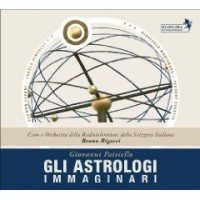
It is always a relief when one comes across a wonderful creation, a new existence, a rediscovery. One feels regret for not knowing it before, but alas, the joy overflows. The fear of unknown, the fear of leaving the comfort zone always ends up with enlightenment and embracing the new known. In this case, is Gli Astrologi Immaginari by Paisiello.
Giovanni Paisiello (1740-1816) may not be known to large crowds besides his popular arie antiche, which all conservatory students had to learn in some step of their education (e.g. cor piu non mi sento”); however he was one of the finest and hardest working composers of his generation. He composed some 94 operas, and hundreds of other compositons. He started studying classical singing, later focused on composition in the Conservatorio di S. Onofria at Naples.
His masterpiece Il Barbiere di Siviglia gave him a reputation all over Europe, while most music critics point to Gli Astrologi Immaginari to be one of his finest. So did Empress Catherine of Russia who summoned him. While his stay in Russia, Paisiello composed a dozen of operas. The reviewed opera became so popular that it was translated in several languages, and performed many times.
What we have in our hands today is a handsome CD of the latter, from Nuova Era, recorded by Radiotelevisione Della Svizzera Italiana in 1967 under Bruno Rigacci. The cast, though not first rate, do some justice to this light and amusing opera. The whole piece is 72 minutes and is a classical fun/disguise/misinterpretation/happy end story of an elderly father Petronio (bass Teodoro Rovetta), his two daughters Clarice (soprano Carmen Lavani) and Cassandra (mezzo-soprano Angela Vercelli), and a stranger, Giuliano (baritone Giancarlo Montanaro), who presents himself as a famous philosopher in order to obtain Clarice’s hand.
The opening Sinfonia is an incredible delight, although short. Under the baton of an outstanding Rossini conductor such as Abbado or Chailly, it would be a masterpiece all by itself. (Let’s be fair… Still, both the orchestra, conductor and the chorus are doing justice to the work.) The rest is a series of recitativo, ensemble and arias… the traditional technique and delivery of the period music.
One actually admires the intelligent composition of ensembles more than the arias, since they reveal more depth about the characters, and even the performers deliver better . Nonetheless, three arias are standouts: Clarice’s “Mi si guida la mia stella”, Giuliano’s heavenly “Vi lascio in pegno al core”, and “Salve tu Domine.”
The cast consists of European singers. One guesses that it would be unfair to expect a cast with big names for an almost unknown work at the time of this recording. Yet, this is the only commercially available studio recording so far. Lavani stands out with the bright lyrical sounds she produces all throughout the piece, if not sometimes routine TKTK (she starts slightly flat, reminding one of the horrible experience La Tebaldi had in one of her classes). The contrast between her and the mezzo Vercelli is profound, as it should be, considering the difference in their characters. Rovetta should have known better since this opera is magnificent showcase for a basso buffo/comico voice, yet he fails to deliver, especially in the solo lines. One wishes to hear a Taddei or Bruscantini’s lyricism in both male roles, especially in Petronio’s “A voi darla in matrimonio.”
This one-CD recording comes in a handsome cover and the information included in the booklet enlightens us about Paisiello and his life. However, one is disappointed with the lack of libretto translations, which is only included in the original Italian by Giovanni Bertati. It is of extreme importance that such works who were left in the shadow for centuries come with translations in major languages in order to be promoted.
Most critics may find this opera very “simple”, or “not sophisticated enough”, nevertheless, if one considers that Paisiello used to compose seven operas a year, this is a huge accomplishment. Yet, this opera, like many others, did not live long to become popular enough to be included as a repertoire opera.
Wouldn’t it be great if the Met and other big houses produce concert or semi-staged versions of short pieces like this? First of all, they would be very economical to produce, and then, they could take away all that craze and obsession of big and popular operas, and one would be delighted to see people learning about these undiscovered jewels instead of crucifying Bondy or Zeffirelli.
It is always like watching sport fanatics when one witnesses opera lovers going extreme and fight for “their” opera, or performer or producer, and so forth. There is nothing wrong with it. However, opera is more than that. We are so busy discussing which half of the glass if empty, that we often forget there is a whole endless ocean out there waiting to be discovered.


























Comments